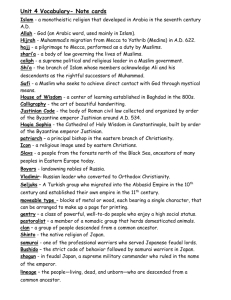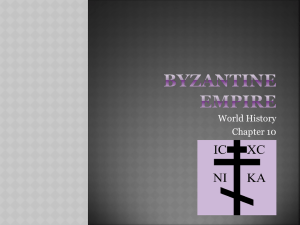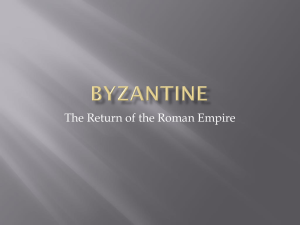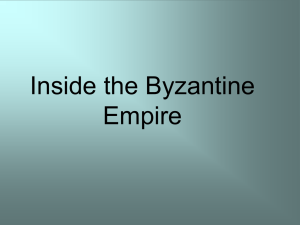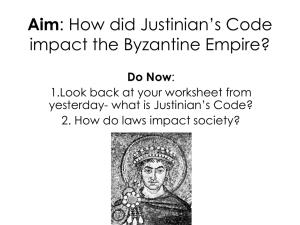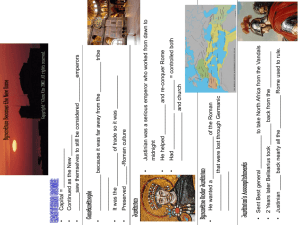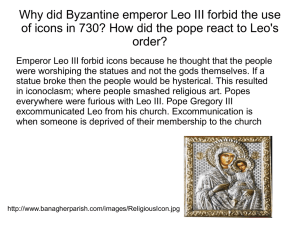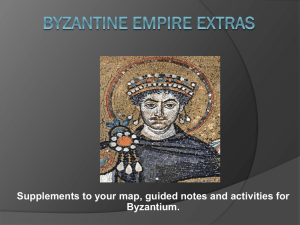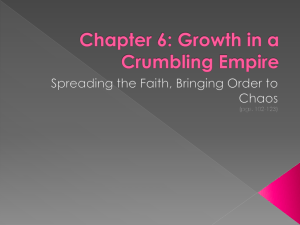Justinian
advertisement
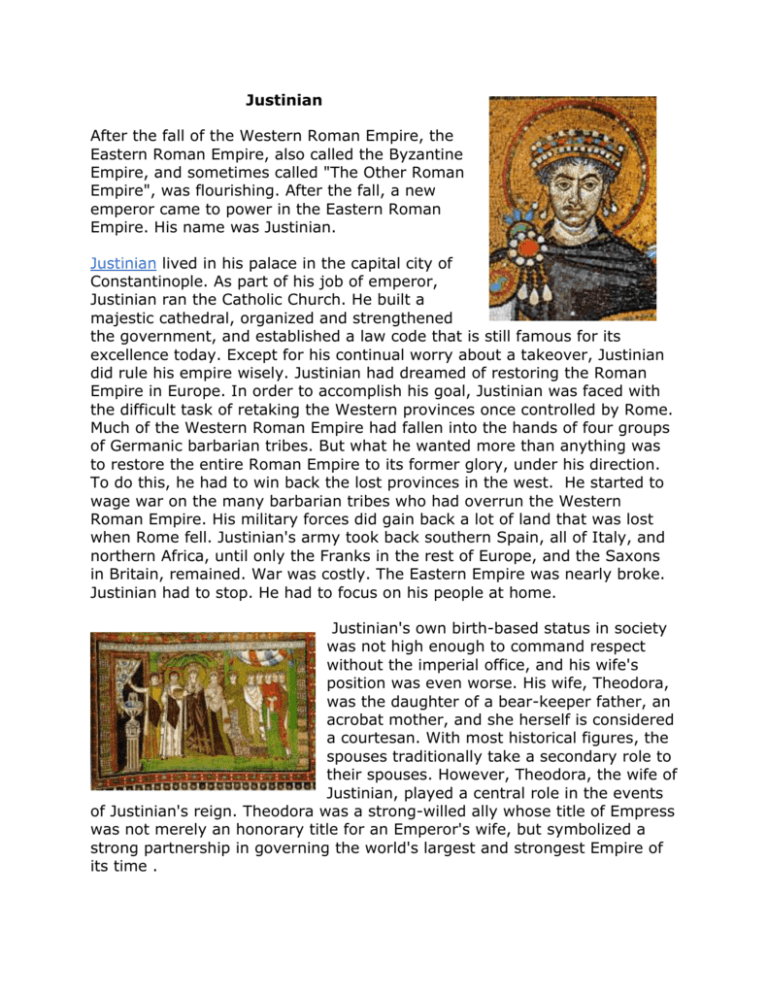
Justinian After the fall of the Western Roman Empire, the Eastern Roman Empire, also called the Byzantine Empire, and sometimes called "The Other Roman Empire", was flourishing. After the fall, a new emperor came to power in the Eastern Roman Empire. His name was Justinian. Justinian lived in his palace in the capital city of Constantinople. As part of his job of emperor, Justinian ran the Catholic Church. He built a majestic cathedral, organized and strengthened the government, and established a law code that is still famous for its excellence today. Except for his continual worry about a takeover, Justinian did rule his empire wisely. Justinian had dreamed of restoring the Roman Empire in Europe. In order to accomplish his goal, Justinian was faced with the difficult task of retaking the Western provinces once controlled by Rome. Much of the Western Roman Empire had fallen into the hands of four groups of Germanic barbarian tribes. But what he wanted more than anything was to restore the entire Roman Empire to its former glory, under his direction. To do this, he had to win back the lost provinces in the west. He started to wage war on the many barbarian tribes who had overrun the Western Roman Empire. His military forces did gain back a lot of land that was lost when Rome fell. Justinian's army took back southern Spain, all of Italy, and northern Africa, until only the Franks in the rest of Europe, and the Saxons in Britain, remained. War was costly. The Eastern Empire was nearly broke. Justinian had to stop. He had to focus on his people at home. Justinian's own birth-based status in society was not high enough to command respect without the imperial office, and his wife's position was even worse. His wife, Theodora, was the daughter of a bear-keeper father, an acrobat mother, and she herself is considered a courtesan. With most historical figures, the spouses traditionally take a secondary role to their spouses. However, Theodora, the wife of Justinian, played a central role in the events of Justinian's reign. Theodora was a strong-willed ally whose title of Empress was not merely an honorary title for an Emperor's wife, but symbolized a strong partnership in governing the world's largest and strongest Empire of its time . In January 532, crowds resentful of taxation and corruption rioted at the games at the Hippodrome, in what became known as the Circus, or Nika, Revolt. Justinian considered fleeing Constantinople. Instead of taking flight, Theodora urged her husband to remain in the city to fight back and crush the revolt: Justinian heeded her advice and the revolt was crushed, with some thirty thousand rebels slaughtered by his soldiers that day. Theodora led the way for social reforms that uplifted the role of women in Byzantine society. She is credited with influencing many reforms, including some which expanded the rights of women in divorce and property ownership, forbid exposure of unwanted infants, gave mothers some guardianship rights over their children, instituted the death penalty for rape and forbid the killing of a wife who committed adultery. Theodora died early in Justinian's reign, in 548, and was buried at the Church of the Holy Wisdom, one of several churches she and her husband would build in Constantinople. Justinian would not remarry, ruling his empire alone until his own death in 565. Justinian, the last emperor to use Latin, ruled until 565, leaving an impressive list of achievements that included a vigorous attempt to reclaim lost imperial lands in the west, the codification of old Roman law, and the construction of Hagia Sophia. Justinian was perhaps the last emperor that seriously entertained notions of reconquering the west—the rule of the western empire fell permanently vacant in 476 and the Byzantine emperors claimed as theirs. His expeditions against Italy, however, failed. Although he conquered North Africa and retook Italy from the Ostrogoths, these wars drained the Byzantine Empire of much-needed resources. The Italian territories fell into the hands of another Germanic tribe, the "Long Beards," or Lombards. Justinian, however, is most famous for the body of laws that he organized— the Corpus Juris Civilis. This was a great legal achievement in codifying Roman law. The Justinian Code, was the result of Emperor Justinian's desire that existing Roman law be collected into a simple and clear system of laws, or "code." Tribonian, a legal minister under Justinian, lead a group of scholars in a 14-month effort to codify existing Roman law. Emperor Justinian chose ten men to review 1,600 books full of Roman Law (Twelve Tables) and create a simpler legal code. These men were able to create the Justinian Code with just over 4,000 laws. The laws were recorded in four books. Although Byzantium would eventually fade in influence, Justinian's Corpus Juris Civilis became the foundation of all European law and legal practice. Justinian is also credited for founding Byzantine architecture with his building of the Hagia Sophia in Constantinople. Constantinople’s religious center was damaged during the Nika Rebellion. several important religious and imperial buildings including the original Hagia Sophia. A newer version of the church of Divine Wisdom, its true name - was dedicated by the Emperor Justinian in 537AD. a church like none other ever seen before. The scale of the building exceeded any domed building attempted before and tested the abilities of the Emperor's architects and emptied the state treasury. Hagia Sophia was - and is - justly celebrated for the luxuriousness and opulence of its decoration which included rare and costly marbles, acres of gold mosaic and rich liturgical furnishings. The Hagia Sophia continued the Roman tradition of building domes, the architecture of the Roman basilica, but it was carried out on a scale unheard of in earlier centuries. It is a style that fuses both Roman mosaic realism and an otherworldly, almost abstract use of simple forms and dramatic colors. Justinian and Theodora Remake the Roman Empire Hagia Sophia
